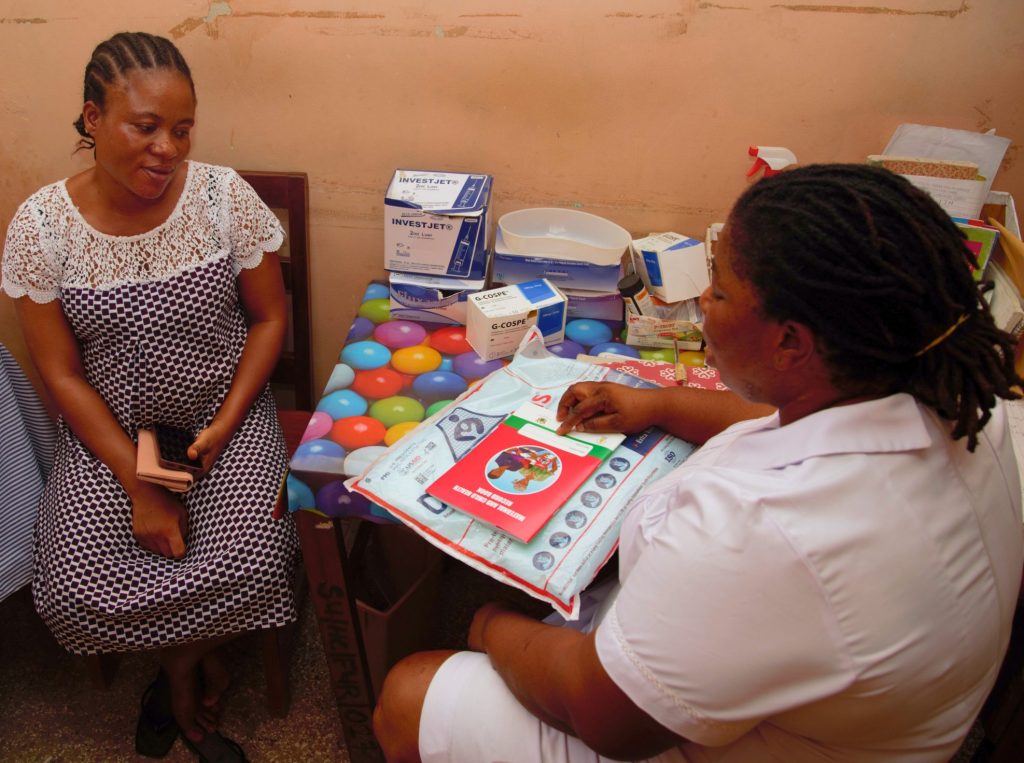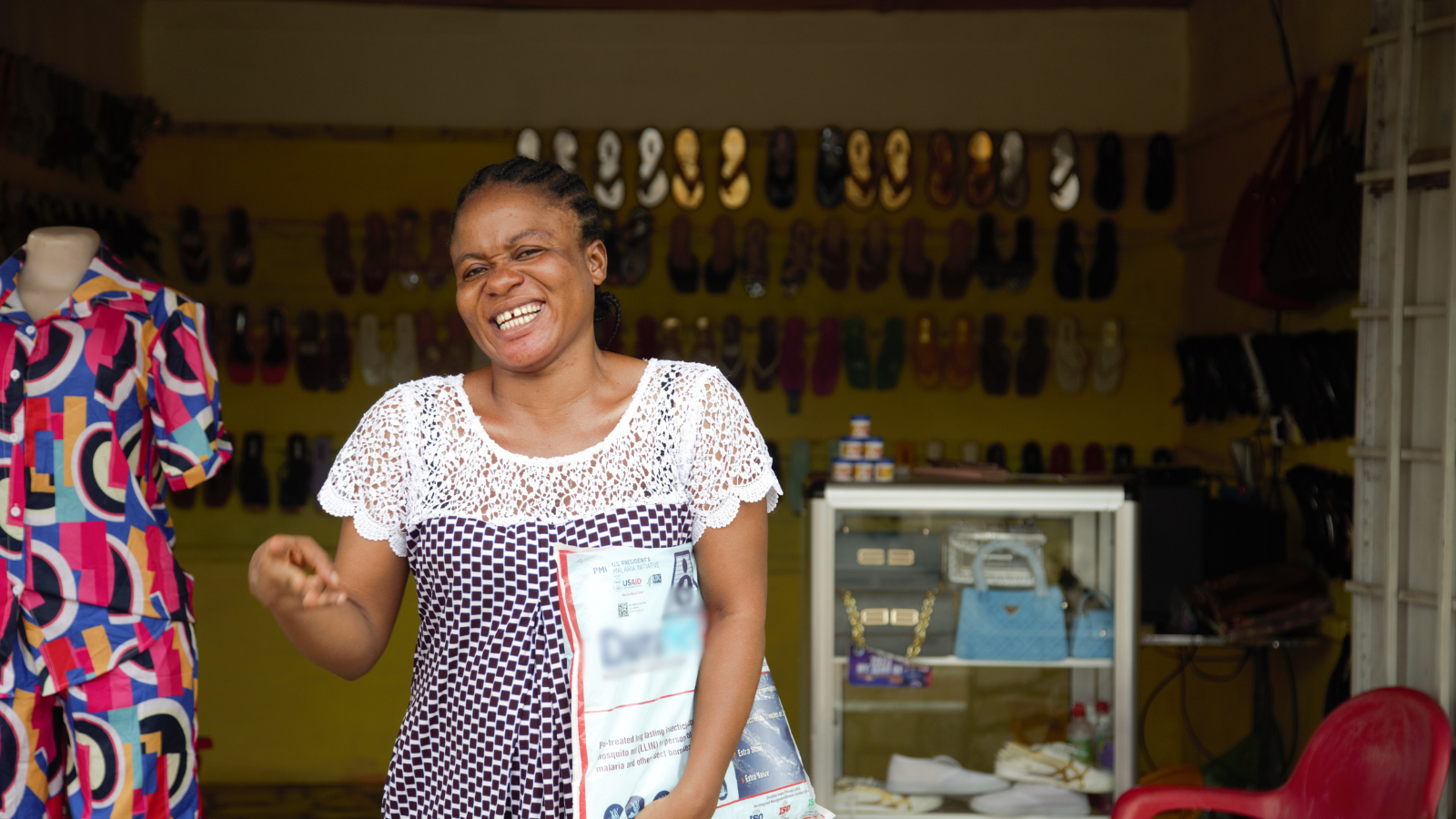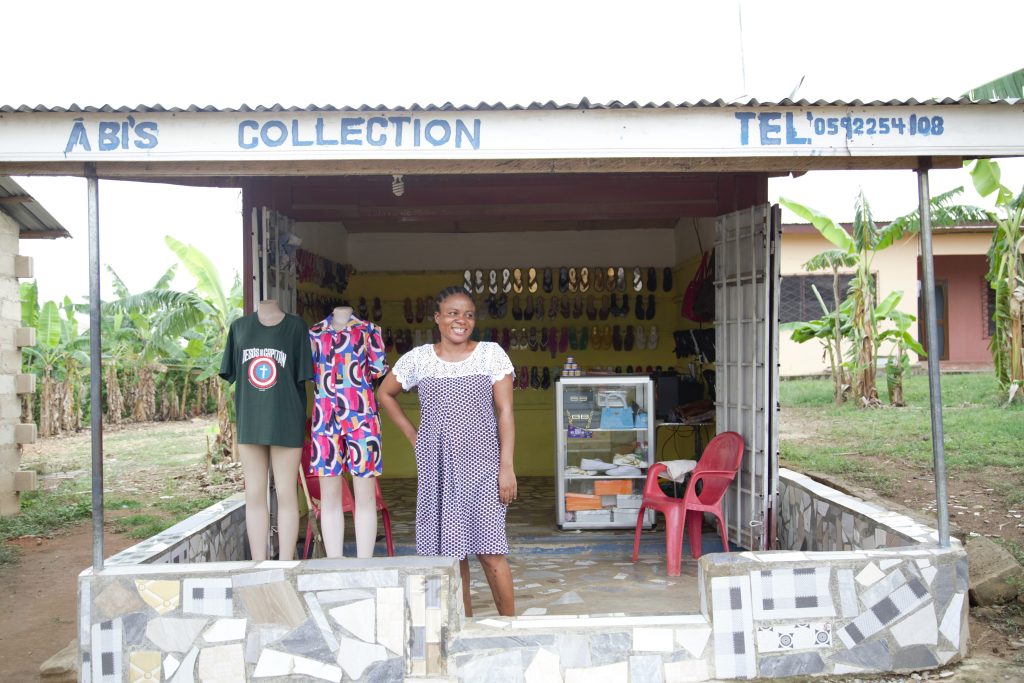Abigail, a mother, wife, and small-scale trader, lives among lush greenery in Suhum, Ghana, amidst sweltering heat and buzzing mosquitoes. Abigail’s life orbits around the well-being of her family, especially her spirited seven-year-old daughter, Ella, and she works hard at her business partnering with her husband to provide for their family. As a trader, Abigail buys and sells women’s shoes, bags, and dresses. She is proud of her business. Picking out the best outfits for her clients is her hallmark.
Every day, Abigail gets her daughter ready for school, drops her off, and commutes for about thirty minutes to her store. When she returns home in the evening, she begins a nightly ritual that involves preparing dinner and meticulously unfurling the mesh of the insecticide-treated nets that protect her and her family against malaria while they sleep at night.
“If we were not sleeping under a mosquito net, we would have malaria often because there are always mosquitoes…All three of us could become sick at the same time, and you cannot go to the hospital empty-handed; you need to have money,” says Abigail.
As Abigail drapes the nets over their sleeping spaces, her thoughts drift back to a time when malaria crept into her home. It was four years ago. Her daughter, Ella, then just three years old, had fallen ill with a fever. Abigail took her daughter to the closest health post where she was tested and treated for malaria. During this time, Ella could not attend school for several days, and Abigail was barely able to work.
On top of the fear of watching a child suffer from malaria, the economic burden of malaria can be difficult to manage, especially when one’s child falls ill repeatedly. In addition to the money spent on malaria testing and treatment, Abigail lost an average of US$12 a day in sales because of being away from her business while her daughter was sick. This is a sizable amount in a country where the minimum wage is around US$1.50 a day. Thus began a journey that would shape Abigail into the formidable guardian of her family against the disease.

A midwife meets with Abigail to discuss malaria prevention. Photo credit: Patience Ama Owusu, GHSC-PSM
With a second child on the way, Abigail knows the value of protecting herself, Ella, and her unborn child against malaria and has imparted to her daughter the importance of the nightly ritual of hanging the nets to protect them from malaria-carrying mosquitoes.
The U.S. President’s Malaria Initiative (PMI) partners with Ghana’s national malaria program to help millions of families, like Abigail’s, protect themselves from malaria. PMI is bringing insecticide-treated nets closer to the doorsteps of women and children by supporting the distribution of nets at schools and integrating them into the country’s last-mile delivery program to health facilities to ensure uninterrupted access to malaria prevention.
Prior to the last-mile delivery program, health workers were responsible for picking up nets from district stores. This wasn’t always possible to do in a timely manner due to issues such as health worker workload and distance to the pick-up location. As a result, the clinics would often run out. But, through the last mile delivery program, nets are always available and are distributed at prenatal and child welfare clinics. The school-based distribution of nets expands access to families who do not need to attend prenatal care clinics.
This “simple” intervention makes a big difference to people like Abigail whose story echoes the experiences of countless mothers across Ghana, where the threat of malaria looms over daily life. Abigail received a brand new mosquito net during her prenatal care visit to the clinic and her daughter, Ella, received one at school. Now armed with knowledge about the value of using the nets, Ella encourages her mother to hang the new net she brought home from school.
Since 2020, PMI has supported the distribution of more than 650,000 insecticide-treated nets through the last-mile delivery program in Ghana. In fiscal year 2023 alone, over 270,000 nets were distributed to health facilities, including those in remote communities, and 1.4 million nets were distributed to primary schools across the country.
To Abigail’s family, the nets have become more than just a physical barrier against malaria but also a symbol of resilience.
“We are not going to stop using them,” Abigail says. “[Mosquito nets] give us peace of mind, and we do not have to worry about malaria.”
As Abigail’s family grows, so does her unwavering commitment to safeguarding her family’s health and well-being. Thanks to PMI, she has the ammunition to do just that.
Cover photo: Abigail in her shop. Photo credit: Patience Ama Owusu, GHSC-PSM
The USAID Global Health Supply Chain Program-Procurement and Supply Management (GHSC-PSM) project purchases and delivers health commodities-including those for malaria, strengthens national supply chain systems, and provides global supply chain leadership to ensure lifesaving health supplies reach those in need, when they need them. By working closely with country partners and suppliers worldwide, the project aims to promote well-being and help countries develop sustainable supply chain systems.


